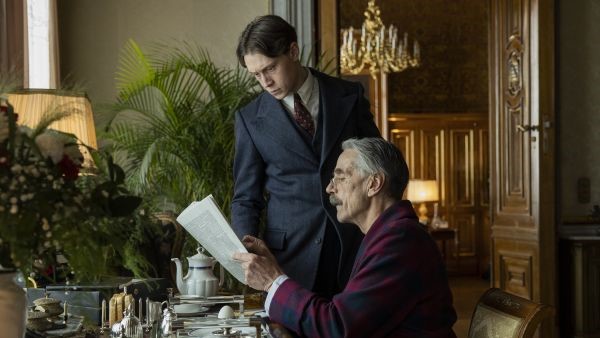What to Watch Verdict
Munich — The Edge of War tries halfheartedly to reframe Neville Chamberlain as a shrewd hero, but with little success.
Pros
- +
The core friendship between a Brit and a German in the run-up to WWII is well acted
- +
Jeremy Irons does a decent job as the seemingly enfeebled Chamberlain
- +
Telling the story of a German who wants to take Hitler down from the inside is a compelling track to take
Cons
- -
Considering the history surrounding Chamberlain's choice to sign away the Sudetenland, this film has little attempt to build up suspense or savvy
- -
Chamberlain's decision is only treated as smart after it's made, essentially hiding any attempt to make him more heroic until the end
- -
The German side of the story is vastly more interesting, but gets less screen time
Munich — The Edge of War is a strange little shrug of a World War II drama. Set primarily in 1938, leading up to the fateful decision on the part of the British Prime Minister Neville Chamberlain to sign the Munich Agreement, this new Netflix film focuses largely on the attempts of two young men — one on the side of the Brits and one on the side of the Germans — working behind the scenes to avoid triggering an all-out war. Part of the problem with Munich — The Edge of War is that you don't have to be a history major to know these attempts will fail, making for a tension-free story that holds little surprise. The other issue is that only half of this larger interpersonal drama is remotely compelling and yet it's given far less screen time.
George MacKay makes the jump from World War I to World War II after his breakout role in Sam Mendes' 1917. In Munich — The Edge of War, he plays Hugh Legat, an Oxford graduate who works in the office of the Prime Minister Neville Chamberlain (Jeremy Irons), whose time and effort is solely focused on the oncoming threat of Nazi leader Adolf Hitler (Ulrich Matthes). Legat has largely eschewed his wife and child. Instead, he's trying to make his way in a government that seems shaky and ill-prepared to handle what most viewers will recognize as the prelude to a truly devastating world war. Legat is soon informed that an ex-friend of his, fellow Oxford graduate Paul von Hartman (Jannis Niewöhner), has confidential information he wants to pass to the Brits, so the two young men reconnect after years apart while engaging in some light espionage.

The film, based on the novel by Robert Harris, has at least one genuinely compelling idea, one that served as the main story for Bryan Singer's action drama Valkyrie: what would it be like to be a German living at the time of the Nazi Party who tries to bring down Hitler from within?
In one of this film's brief flashbacks to 1932, Hugh is horrified to see that his friend Paul has seemingly guzzled the Kool-Aid on Hitler and the Nazis, as he loudly shouts in favor of Hitler's theories in a Munich bar in what turns out to be their last day as friends. But when Hugh meets Paul in Germany in 1938 as they engage in espionage, he realizes that Paul has changed his tune and, despite working within the German ministry, the young German is more clear-eyed than anyone else about exactly how bad Hitler is, for his country and the world.
As tragic as Paul's efforts are — this film is not treading in the footsteps of Quentin Tarantino's Inglourious Basterds, so no revisionist history occurs — his efforts are treated like a glorified subplot. Niewöhner is extremely effective throughout Munich — The Edge of War, easily the film's best performer despite Irons and MacKay being more recognizable to English-speaking audiences. He's not only disturbingly convincing in the flashback where Paul is all-in on Nazism, but he's equally passionate and desperate when he tries to convince both Hugh and Chamberlain himself that Hitler is a force to be terrified of, let alone to be reckoned with.
However, Munich — The Edge of War is much more interested in watching the chamber-room drama of the oft-considered-weak Chamberlain and aides like Legat. There's very little tension here and even less attempt to flesh out Neville Chamberlain — beyond the historical view that he was a leader who capitulated to a German gangster, instead of pushing back.
There's a late scene that's meant to be key to clarifying Chamberlain's choice to both sign the infamous Munich Agreement — giving away the Sudetenland to the Germans — and make Hitler sign a separate document that would tie him to a declaration of future peace. But instead of turning Chamberlain into a cleverer-than-realized figure, all this does is make him — and by extension, assistants like Legat — seem extremely naive. Yes, the world did eventually realize that Adolf Hitler was a truly evil man but proving that he reneged on a declaration of peace feels toothless in the wake of the millions of people whose deaths he was responsible for.
The latest updates, reviews and unmissable series to watch and more!
Munich — The Edge of War wants to shake up the notion that Chamberlain was a pushover, to make him seem like a cautious and shrewd political player. But like the established view of Chamberlain suggests, this film waits far too long to make its own position known. And by the time the film reaches an abrupt finale, it seems clear that it was the fatalism evinced by Paul, instead of the hope professed by Hugh to his wife about the future, that was accurate.
The movie's final title card tries to suggest that Chamberlain helped delay the eventual war, but considering how devastating it ultimately was, it's hard to see him as more than a feckless politico with little awareness of how terrifying the world would become. And this film's unwillingness to be more clear-eyed about its major character's choices winds up being its biggest mistake.
Munich — The Edge of War debuts exclusively on Netflix on Jan. 21.
Josh Spiegel is a freelance cultural critic who has been published in Slashfilm, SyFy, ScreenCrush, The A.V. Club, The Hollywood Reporter, The Washington Post and others. His favorite films include Singin’ in the Rain, The Rocketeer, Pinocchio and A Matter of Life and Death. His favorite TV shows include Ted Lasso, Only Murders in the Building, Deadwood and Lost. He lives in Phoenix with his wife, two sons and too many cats.



